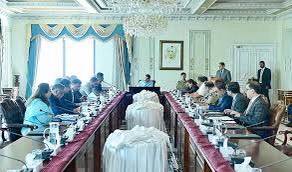PM Kakar makes important decision on electricity theft issue
Shares

In Islamabad, Caretaker Prime Minister Anwaar-ul-Haq Kakar made a firm commitment on Monday to take decisive action against individuals engaged in "electricity theft." This announcement came as his administration grapples with widespread protests across various regions of Pakistan triggered by soaring electricity bills.
Over the past week, outraged citizens have taken to the streets in different parts of the country in response to the government's decision to raise power tariffs in July. The protests reached a peak on Saturday when shops and markets remained closed in cities such as Lahore, Karachi, and Peshawar. Demonstrators expressed their frustration by staging protest rallies and even burning their electricity bills in defiance of the tariff increases.
These developments follow Islamabad's crucial $3 billion deal with the International Monetary Fund (IMF) signed a few months ago to avert a potential default due to years of mismanagement and instability. A Rs7 increase in the basic tariff was approved in July and was set to be implemented from September. Additionally, in August, the National Electric Power Regulatory Authority approved an additional hike of Rs4.96 per unit, but the implementation of this increase has been delayed due to ongoing protests.
Prime Minister Kakar has consistently emphasized that his government is actively seeking a solution to alleviate the burden of high power bills on the general population, who are already grappling with soaring inflation.
Radio Pakistan, the state-run broadcaster, reported, "Caretaker Prime Minister Anwaar-ul-Haq Kakar says the government will take stern action against electricity thieves." The report detailed that the Prime Minister chaired a meeting in Islamabad, during which he received a comprehensive briefing on the state of the power sector.
During this meeting, the Prime Minister was informed about various aspects of electricity generation, including potential, installed capacity, actual generation, and distribution under different weather conditions.
Prime Minister Kakar, in a statement to journalists on August 31, reiterated Pakistan's commitment to honoring the agreements it has entered into with international financial institutions. He emphasized that Pakistan would not deviate from these agreements, as they are binding and necessary in a free market environment.
These protests are occurring at a time when Pakistan's economy is facing significant challenges, marked by the depreciation of its currency against the US dollar and a substantial decline in the country's stock exchange, which lost over 1,200 points on a recent Thursday.
